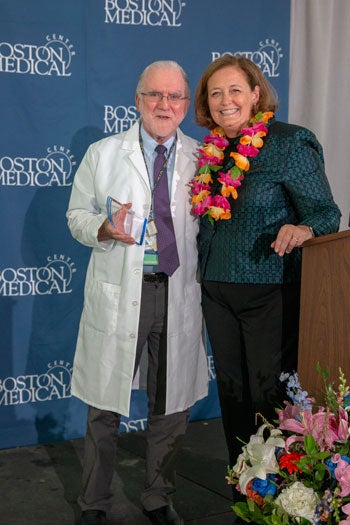- Helping Children Thrive with the Center for the Urban Child and Health Family
- New Combined Family Medicine-Psychiatry Residency Trains Future Community Health Leaders
- What do you do, Glen Foley?
- Special Kids Special Care Program Takes on the Most Complicated Cases
- News of Note
Helping Children Thrive with the Center for the Urban Child and Health Family

How do you help children reach their full potential? Routine medical care helps, but the Pediatrics Department at BMC knows that it will take more than just yearly check-ups. To help establish health equity for all children, the department has formed the Center for the Urban Child and Healthy Family.
“We believe that all children should have an equal opportunity to be healthy, ready to learn, and to achieve their full potential,” says Megan Bair-Merritt, MD, MSCE, the Center’s executive director. “But pediatric care delivery is often based on what we did many years ago and doesn’t reflect the challenges families face today. Our Center is reinventing pediatric care for families facing adversity, with the goal of achieving health equity for families.”
Aligned with BMC’s Vision 2030 of making Boston the healthiest urban population in the world, the Center has a set a goal that by 2028 all children cared for by BMC Pediatrics will be healthy, ready to learn, with adequate supports to thrive in school by age 5. By focusing on families with a child from birth through 5, the Center is promoting bi-generational health, supporting wellness during a period—the first 1000 days—that profoundly affects health across the life course, and creating deep partnerships with education and social service sectors.
The work towards this vision is guided by three core principles. The first is to put families first and keep them deeply engaged in care. To this end, the Center has a Family Advisory Board that meets monthly and provides suggestions, as well as feedback on interventions. The Center is also partnering across different departments at BMC to help ensure that everyone in the families they serve is getting optimal care.
The second is to foster community partnerships, as their work requires partnerships both inside and outside the hospital. The Center is therefore evaluating the landscape of where their patients come from and what community supports are available, to ultimately find the best ways to form partnerships.
The third principle is to rigorously evaluate all the work the Center does. Currently, researchers are working on finding the best framework for this, as well as collecting data. This will help the Center evaluate long-term outcomes for current programs and find the best ways to improve and create new programs.
To help reach their vision, the Center put out a request for proposals for innovative care and programs for children aged birth to five years. They began funding two programs: SOFAR and the EASE Clinic.
Supporting Our Families through Addiction and Recovery (SOFAR)
SOFAR serves newborns who are born exposed to substances, and their mothers. The goal of the clinic is to provide care to both infants and mothers in the same space, to help eliminate barriers to care. Care includes well-baby visits, substance use treatment, hepatitis C diagnosis and treatment, long-acting reversible contraception, and mentorship and peer counseling for mothers. The clinic launched in July 2017 and has since served approximately 90 mother/infant pairs .
In addition to providing care, SOFAR is also conducting research to understand the issues facing both mother and baby and if their interventions are successful in treating these issues. This will both facilitate continuous quality improvement and to evaluate its impact on health outcomes.
The Individualized Education Plan (IEP) Clinic
The second proposal the Center funded was the IEP Clinic, which provides services to children with special developmental and behavioral needs. Many children who need IEPs have related health issues, such as autism or attention deficit-hyperactivity disorder, which means that schools and health care providers need to work together to ensure better outcomes for students. The IEP Clinic assesses the degree to which an IEP is meeting a child’s medical and learning needs, and helps facilitate a more active medical-school partnership.
Children are referred the IEP Clinic to update existing IEPs or create new ones. These children are seen by BMC providers and developmental and pediatric specialists to help facilitate the process. The clinic can also help advocate with the child’s school to ensure the child is appropriately tested and supported to thrive in school. In the last year, the clinic has served approximately 75 children.
The EASE Clinic is also conducting research on the clinic’s impact on health and scholastic incomes.
The Center has also launched a two-year Urban Health and Innovation Fellowship program to advance the skillsets of young pediatricians in the areas of advocacy, innovation, policy, social determinants, and population health. Lucy Marcil, MD, MPH, is the inaugural Fellow. Dr. Marcil is working on expanding StreetCred, a program she co-founded in 2015. StreetCred helps families file their taxes in the waiting room when they bring their child for a pediatric visit, and enables them to receive the full tax refund to which they are entitled.
“BMC Pediatrics has always been a leader in care innovation. We look forward to serving as a national model of the pediatric practice of the future,” says Bair-Merritt.
New Combined Family Medicine-Psychiatry Residency Trains Future Community Health Leaders

BMC is responding to a pressing need in healthcare – better integration of behavioral healthcare into clinical settings – through a new five-year combined family medicine and psychiatry residency program. When the two new residents started last month, BMC became the sixth joint family medicine-psychiatry residency program in the country, and the only one in New England.
“For many years, there has been a pretty significant divide between medical and behavioral healthcare. But what we really need to be doing is having them work very closely and collaboratively to make a difference,” said Glennon O’Grady, MD, co-director of the new joint residency program.
According to O’Grady, patients struggling with both mental health or substance use issues and chronic medical ailments have a shorter life expectancy by almost 20 years compared to the average patient. Programs like BMC’s family medicine-psychiatry residency and better integration of behavioral health and primary care, O’Grady believes, can better serve the needs of complex patients.
Robert Joseph, MD, MS, vice chair for integrated behavioral health at BMC, is also a co-director of the combined residency.
“In addition to the increased medical morbidity found in patients with mental health or substance use disorders as noted by Dr. O’Grady, it’s also true that the majority of patients with mental health conditions are seen by their primary care provider as opposed to a mental health specialist,” said Joseph.
“Residents will see what they’re trained to see. When we emphasize treating behavioral health issues while they’re training in primary care, we’re highlighting skills that are needed right now across the health system.”
For the selected residents Eduardo Garza, MD, and Saikrishna Kugabalasooriar, MD, their BMC journey is just beginning, but they have hit the ground running and are bringing new perspectives to the hospital.
Garza, who spent time living in Texas and Mexico while growing up, was first inspired to become a physician by his pediatrician. While Garza was also interested in psychiatry, he fell in love with family medicine during one of his clinical rotations at The Warren Alpert Medical School of Brown University.
“With family medicine, you get to see people at all stages in their life, and you get to be someone who becomes a part of your patients’ lives,” said Garza. “When I learned that there were combined residency programs, it just made sense to me. It feels like a holistic approach and a more well-rounded view of what caring for a person is.”
Kugabalasooriar, originally from Maine and Burlington, Mass., entered Boston University School of Medicine with limited knowledge of family medicine and psychiatry. However, by engaging in activities that interested him, such as integrative medicine, clinical and communication skills training, and Healer’s Art, he was already headed down a path to family medicine. At BUSM, Kugabalasooria also volunteered with the Outreach Van Project, which brings food, clothing, and care to the homeless population in East Boston.
Garza and Kugabalasooria’s residency starts with “foundation work,” including inpatient rotations for family and adult medicine, pediatrics, obstetrics, and then further integration with psychiatry. They work mostly out of the South End Community Health Center, a key component in their training in community health systems.
“All of our mentors are leading community health systems, and they inspire us every day,” said Kugabalasooria.
O’Grady and Joseph both hope that the new joint residents will provide two-way training for attending physicians through joint conferences and precepting.
“I’m hoping that the family physicians who are not psychiatrists will learn more psychiatry by being a part of the teaching process,” said O’Grady.
What do you do, Glen Foley?

Name: Glen Foley, RPh.
Title: Clinical Pharmacist (primarily with the Pediatric Department)
Time at BMC: 46 years
Q: What do you do at BMC?
A: If I’m working in the Central Pharmacy, then I process prescription drug orders from all departments. If I’m working in the Menino Pavilion, then I help the Emergency Department meet their pharmacy need, and we also verify OR orders. In the clinical outpatient departments, my work includes filling prescriptions and preparing eye product compounds.
I mostly work in the Central Pharmacy verifying and filling prescriptions. This process also includes checking for discrepancies and drug interactions, and verifying the patient’s allergy status and past medical history to ensure that the medication matches the physician’s order. Because we’re a teaching hospital, many physicians are interns, so we monitor all the systems to help ensure accuracy and educate the interns as necessary.
Q: What’s the best part of your job?
A: The best part is the finality of getting a product processed and to the floor on time so it can get to the patient. I especially enjoy working in Pediatrics with the kids who are living with conditions like asthma and sickle cell disease. It’s very rewarding to see them go home.
Q: What brought you to Boston City Hospital?
A: When I graduated from pharmacy school, I worked for a retail pharmacy, but didn’t particularly enjoy it. I had been a patient at City Hospital several times and had a sister who was a nursing student at the former Boston City Hospital School of Nursing, so I was familiar with the hospital. My sister recommended that I apply for a pharmacy position, and I got the job. I didn’t expect to stay for 46 years.
Q: What do you remember about your first day?
A: It was August 30, 1972. My first day was really awe-inspiring. A retail pharmacy environment is very different, so I didn’t realize how much work there was to do in a hospital pharmacy. I remember I was like a sponge taking in everything around me because I wanted to understand as much as I could. I also remember how big Boston City Hospital was. There were seven active buildings at that time and a much higher number of patients.
Q: What do you like most about working for BMC?
A: I like the family relationship feeling we have. Each of us is responsible for a certain function, but all of us work as a team. The good thing is that we can all fall back on each other, which means the patients win. Even if systems break down, we work through the situation and make sure the patients get what they need.
BMC is my second home. In fact, I’m here more than I actually am at home! Not only does it feel like a family, but I’ve also worked at BMC with generations of some family members.
Q: What have been the biggest changes you’ve witnessed in your 46 years here?
A: When I started, we were a very small staff. There were only five pharmacists and no technicians, just pharmacy helpers. Each floor would come to the Pharmacy and pick up their processed prescriptions. But through the years we began working as a real team; it wasn’t like that 46 years ago.
Then there was the introduction of computers, which allowed us to get much more involved with patients. Now we’re able to find out their medical histories and what their home environments are like so, so we can better help them with their care. Computers also improved the drug delivery system. The Pyxis dispensing system, in conjunction with the Epic verification processing system, allows us to evaluate and complete the medication delivery system for patient care. When I first started working here, computers were the size of a whole room. That has obviously changed.
Also in the time I’ve worked here I’ve seen how patients with sickle cell now live into their 40s when they previously only lived into their mid-20s. I believe we have the top sickle cell program in the state. That’s really amazing.
Q: Do you have any advice for those people who are looking for a long career at BMC?
A: Be observant. Be polite. Be energetic. Never say “it’s not my job.” If there’s a problem on the floor, try to work through it and then notify someone; don’t just ignore the problem. Listen to those individuals who have been on the job for a while so you can gain their knowledge. And always be proud of what you do because it’s a reflection of what you’re made of.
Q: What do you do for fun outside of work?
A: I play golf when I get a chance. I first started playing when I was 12. I haven’t gotten much better, but I still enjoy it. I’m also a season ticket holder for the Red Sox. At the Service Awards Kate Walsh talked about my giving a Red Sox ticket to a coworker who’d never been to a Sox game, but the other part of the story is that I had the opportunity to be a play-by-play announcer for her through the whole game!
Special Kids Special Care Program Takes on the Most Complicated Cases

BMC Health System’s commitment to ensuring quality health care for everyone is well known. Last fall, that commitment received another vote of confidence when Massachusetts approached BMC HealthNet Plan to manage the Special Kids Special Care (SKSC) program. Since March 1, the work of many individuals across BMC Health System has allowed a long and successful program to evolve further and support some of the most at-risk and medically challenging children in the Commonwealth.
SKSC, which began in 2000, is a partnership among BMC Health System, MassHealth and the Department of Children and Families (DCF), all of whom communicate continuously about these unique patients. SKSC provides intensive care management – including medical and social support – to children with medical complexity from infancy to their 22nd birthdays. Participants also must be in the custody of DCF. The program was administered by Neighborhood Health Plan until this past spring
BMC’s experience coordinating the care of children with medical complexity and addressing their social determinants of health is a critical component of SKSC’s success. BMC Health System partnered with the Boston Medical Center Pediatrics Department to create a team of experienced pediatric complex care managers covering approximately 120 participants across the state.
Jack Maypole, MD, Vice Chair of Population Health and Practice Transformation for the Pediatrics Department, serves as medical director for SKSC. Maypole successfully led the Center for Medicare/Medicaid Innovation grant-funded Collaborative Consultative Care Coordination (4C) Program, which offered similar approaches for children with medical complexity. The 4C Program, along with other assets and knowledge developed over time, put the BMC Health System on the short list of managed care organizations that could oversee Special Kids Special Care.
“We are fortunate that Special Kids Special Care is able to leverage the staffing, systems and knowledge we gained during the three-year 4C program,” says Maypole. “This allowed us to identify the key qualities needed in our team and to ramp up quickly with SKSC at go-live.”
SKSC participants have chronic, complex conditions that require extraordinary effort to coordinate their services and health care. The diverse list of diagnoses includes cerebral palsy, genetic abnormalities, complications of premature birth, cystic fibrosis, neurosensory deficits, and developmental delays, to name just a few. Therefore, SKSC patients tend to present a greater need for technology support and medical equipment, such as feeding tubes, tracheostomies, ventilators, wheelchairs, body braces, monitors, and bedding for their safety and well-being. In addition, many of these children must take multiple medications, often prescribed by different specialists at different hospitals, require frequent hospitalizations, and may need hours of one-on-one care, including private duty nursing when they are released from the hospital.
On the community side, the children’s foster families partner with the SKSC team to identify and mobilize services where needed for long-term management of behavioral, emotional and developmental issues. On the BMC side, dozens of individuals have dedicated time and resources to support the team, children, and families. The BMC HealthNet Plan and BMC Health System works to innovate and problem-solve to minimize or avoid any care disruptions. This small panel of patients is helping build an infrastructure and workflows that will inform more health system work for us in the future.
The SKSC model of care includes pediatric nurse practitioners and pediatric nurse care managers who perform a comprehensive evaluation and tailor an individualized and continuously updated care plan for each participant, tracking key health issues, events and critical partners. To ensure effective and appropriate care, complex care managers offer care support and communicate with the children’s primary care physicians, specialists and other health care providers. SKSC complex care managers regularly communicate with designated DCF case workers and nurses, in tandem with the foster families. Team members offer continuity for children whose placement may be difficult to predict or temporary. They perform home visits and can offer advocacy and care support when patients have medical visits or meetings at school or in the community.
“SKSC has successfully combined the very best offered by the health plan, hospital, and system in full collaboration with MassHealth and DCF,” Maypole says.
One of the most immediate challenges was launching SKSC statewide. According to Jonathan Welch, MD, BMCHP’s chief medical officer, “Even though there would be only a small number of youngsters in the program, they would be spread across the Commonwealth. We had to ensure that our care managers would be able to meet face-to-face with these members and their foster families as soon as possible to understand the immediacy and depth of their needs.”
Despite some of the challenges in caring for SKSC patients, assuming the administration of the program was a sound decision.
“BMCHP, BMC and the entire BMC Health System should be recognized for undertaking this heroic effort,” Maypole said. “I want to acknowledge the SKSC team members, each of whom is a holistic thinker and champion of the kids and foster families they serve. SKSC can be used as a blueprint as the U.S. continues tackling the issue of unifying the often disparate segments of the health care system.”
Cartoon drawing by Jack Maypole, MD.
News of Note
BMC and BUSM Recent Grant Awards
Over the past few months, BMC and BUSM researchers have been recognized nationally with competitive grant awards. These include:
Medicine
- Barbara Corkey: “Boston Nutrition Obesity Research Center(Administrative Core)” NIH-NIDDK, $4,748,833 (4 Years)
- Benjamin Linas: “Researching Effective Strategies to Prevent Opioid Death (RESPOND)” NIH-NIDA, $3,26,957 (5 Years)
- Andrew Henderson: “Signals that Establish and Maintain HIV Latency” NIH-NIAID, $2,222,481 (5 Years)
Emergency Medicine
- Traci Green: “Intervention to Increase Naloxone Engagement and Distribution in Community Pharmacies: A Four-State Randomized Trial” NIH-NIDA, $2,675,766 (4 Years)
Cancer Research Center
- Marjory Charlot: “Merck 598-A Phase 3, Randomized, Double-Blind Study of Pembrolizumab plus Ipilimumab vs Pembrolizumab plus Placebo…” Merck, $771,561 (3 Years)
Psychiatry
- Sarah Valentine: “An implementation science approach to optimizing evidence-based treatments for posttraumatic stress disorder (PTSD) for non-specialty settings” NIH-NIMH, $930,255 (5 Years)
- David Henderson: Psychiatry – “Boston University Medical Campus- Massachusetts General Hospital Global Psychiatric Clinical Research Training Program” NIH-NIMH, $1,655,370 (5 Years)
Pediatrics
- Scott Hadland: “Collaborative Care Office-Based Opioid Treatment for Adolescents” NIH-NIDA, $922,232 (5 Years)
- Marilyn Augustyn: “Developmental-Behavioral Pediatrics Training Program” HRSA, $913,151 (5 Years)
- Renee Boynton-Jarrett:
- “Evaluation of the Impact of the Centering Parenting Clinical Intervention on Kindergarten Readiness” Valhalla Charitable Trust, $750,000 (3 Years)
- “Evaluation of the Impact of the Centering Parenting Clinical Intervention on Kindergarten Readiness” Overdeck Family Foundation, $777,000 (3 Years)
Media Contact:
communications@bmc.org en
en 
 Français
Français Deutsch
Deutsch Italiano
Italiano Español
Español Tiếng Việt
Tiếng Việt Kreyol ayisyen
Kreyol ayisyen